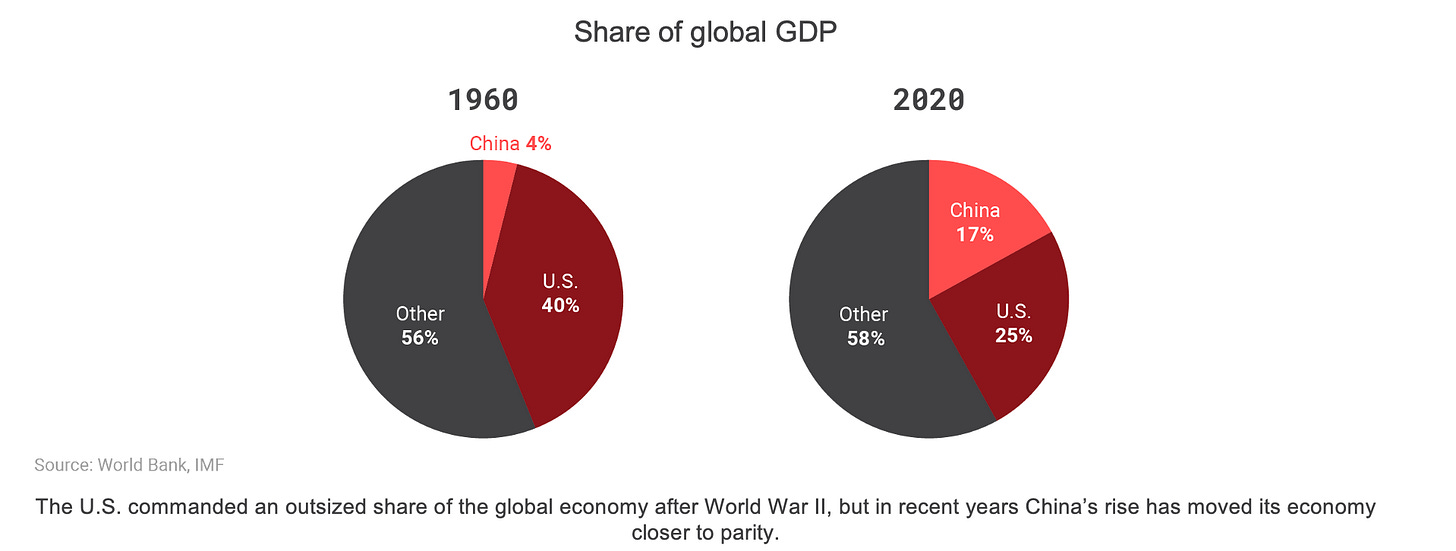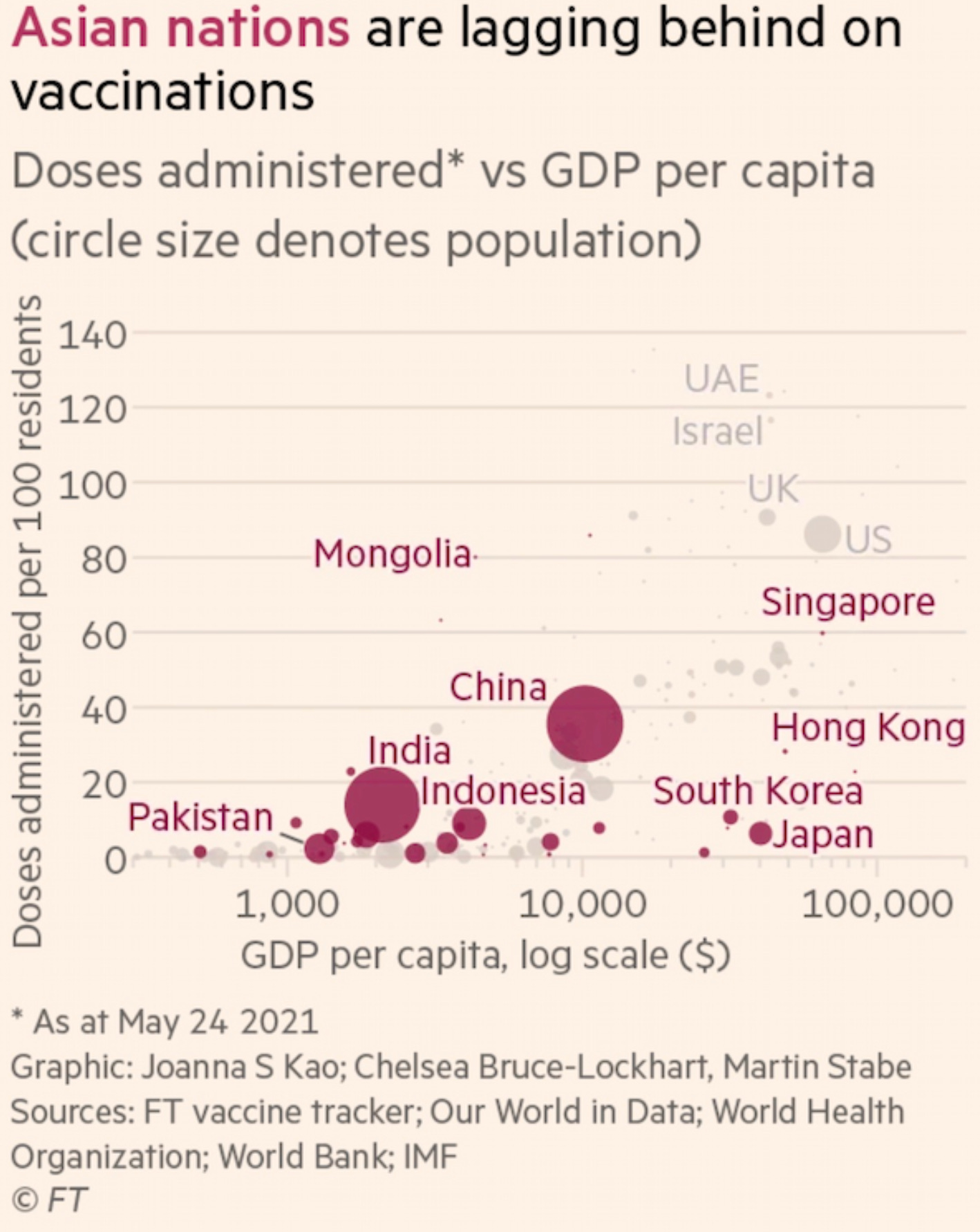I have a new report with Defense Priorities called “The Inevitable Rise of China: US Options with Less Indo-Pacific Influence.”
I argue that people are making two important mistakes when talking about increasing Chinese power: exaggerating the threat to the United States, and underestimating the extent of the power shift we are witnessing. These seem like contradictions, but they are not.
Here’s a figure showing how much has changed since 1960.
Luckily, China does not seek to rule the world like the US has, but mostly wants to be left alone, at most having dominance in its own region. The US might not like this, but it does not have to matter much to American security and prosperity. It is the American commitments to global military dominance and spreading democracy abroad (i.e., regime change) that are the ultimate sources of tension between the two countries. One reason why we know this is that very few countries agree with the American position. Countries are trading more with China, and in most cases not really investing much more in defense, indicating they would rather accommodate than contest the new order. If China was a threat, America wouldn’t need to go to the other side of the world to convince its neighbors of that fact.
The chart above gives a static impression, so does not show that, as a middle income country, China should continue to grow faster than the US over the next several decades. China is about tied with the US in GDP as measured by purchasing power parity, and slightly behind if we go by market exchange rates. Yet China will not only surpass the US on both measures over the next generation, but open up a substantial gap. One projection that uses conservative estimates suggests that by 2050, China could reach half the GDP per capita (PPP) of the US, which means it would have 1.8 times the economy.
This underestimates the Chinese power advantage in the Asia Pacific. For simple reasons of geography, China trades more with the region, giving it more leverage over it neighbors, and in the case of war with the US would be fighting in its own backyard.
When analysts are not hyping the China threat, they are predicting that nation’s decline or collapse. This is also a mistake; the Chinese government has shown itself to be competent, achieving record levels of sustained economic growth and maintaining political stability.
Almost every prominent China analyst out there assumes this cannot last. Perhaps the most obnoxious of these is Gordon Chang, who wrote The Coming Collapse of China in 2001 and still promotes his book like it’s new. Yet even more serious analysts see the Chinese system as unstable when it’s not, likely because they’re committed to a worldview in which, no matter how pessimistic they get about American institutions, no alternative to liberal democracy can outcompete it. “We’re in bad shape, but we’ll always be on top” is a bipartisan cope.
How people talk about COVID-19 shows the bias in coverage. Even if lab leak is true, and I consider it far from certain, we have a bias where the Chinese system is blamed for unleashing the virus, but not given credit for how well they’ve handled the disease.
Some countries did well on controlling COVID-19 and keeping deaths low (East Asia), while others (the US and UK as the primary examples) didn’t really control the disease but did better than almost anyone else on vaccines. When you combine performance on both vaccines and keeping a lid on COVID, I think it’s clear China has done better than any large country in the world. This is not even considering GDP, where China became the first major economy to return to growth, all the way back in second quarter 2020.
COVID-19 was a test of the American and Chinese systems, and one side clearly did better. Even if China made mistakes at the beginning, given the way that the West has failed in its COVID response, it’s simply not credible to think that Europe or America would have done better if they had to go first. This is why 2020 saw China make up more ground on the US economy than in any other year on record. If COVID-19 is any indication, China is better suited to deal with unforeseen disasters than the US is, meaning that I may be underestimating the extent to which it will overtake America as the most powerful country in its region, and ultimately the world.
China is not only catching the US economically, but in scientific and technological achievement in a way that the Soviet Union never could.
While even a decade ago American analysts could claim China was, despite its economic accomplishments, well behind the U.S. in scientific development, the gaps they used to highlight have quickly closed. For example, as of 2008, the U.S. registered 13,800 patents, compared to 828 for China. As of 2019, the Chinese number had risen to around 5,300, while the American number dropped below 13,000. In 2008, the U.S. had a level of R&D spending three times that of China, as computed by the Organisation for Economic Co-operation and Development (OECD). As of 2018, American total spending was only 20 percent higher. Between 2008 and 2018, American R&D spending increased by 21 percent compared to 217 percent for China. In 2020, China passed the U.S in number of academic papers published in the natural sciences. According to the National Science Foundation, since 2014, China has been spending more than the U.S. on experimental development, defined as work “directed toward producing new or improving existing products or processes.”
Moreover, their teenagers do better than American kids on standardized tests by a wide margin.
Achievement scores for young people today are likely to be strong predictors of future scientific, economic, and technological accomplishment, Luckily, the Programme for International Student Assessment (PISA) gives similar standardized tests to 15-year-olds in countries across the world and allows for “apples-to-apples” comparisons. As of 2018, China had the highest reading, math, and science scores in the world while the U.S. was in 13th place. The Chinese scores only came from the four major cities of Beijing, Shanghai, Jiangsu, and Zhejiang, so they are not representative of the country as a whole. Nonetheless, in 2015, the Chinese score in mathematics was higher than that of Massachusetts, which has been shown by domestic assessments to be the top performing American state, while science scores were about equal. The four Chinese cities represented in PISA have a total population of 180 million, compared to fewer than 7 million for Massachusetts, implying that the numbers from that state may represent more of an elite fraction of the national population than the Chinese sample. As one analyst put it, the math difference between Shanghai and Massachusetts in 2012 was similar to that between Massachusetts and Mexico.
So yes, China will continue to rise, but no, it doesn’t have to be a problem as long as we adopt reasonable geopolitical goals rather than engaging in threat inflation or trying to remake the world in our image.
We’re way past the point where decisions made in Washington are going to shape the future of East Asia. American leaders can’t stop the rise of China, but they can adopt unwise policies to try and do so, with results that may range from self-sabotaging trade wars to actual wars with nuclear weapons.
Read the whole thing here.







I'm a bit more anxious than you are about the rise of China. Five or six years ago I imagined that a world with China as dominant power would be a live and let live affair. You want to be a social democracy? You want to genocide a minority group? China doesn't judge, it'll still trade with you and leave you alone. Frankly, this isn't the worst world order I could imagine.
The combination of increased totalitarianism in China and the assertion, via the Hong Kong security law, that they can police speech outside of China makes me much more nervous. It's not hard to imagine China using economic power or threat of military force to censor dissidents in other countries. Also, while it's hard for me to imagine China just going around trying to conquer other countries like Alexander the Great, I can imagine something more like America or even the British empire, in which "defending commercial interests" leads to meddling and war.
For the record, I like China culturally and I don't want a trade war or real war or anything. I want everyone in the world to prosper and necessarily that outcome would make China a powerful country. I'm just worried.
The one place where U.S. may still have an advantage is GDP per capita. I think China will hit a similar ceiling as Japan. The base population is intelligent, but it's not as attractive for the top 0.0001% as somewhere like New York / SF or even Singapore.